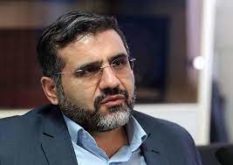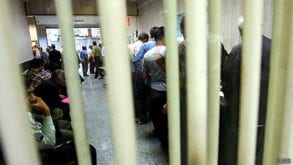Iranwire – On Wednesday, August 25, the Iranian parliament gave its vote of confidence to Mohammad Mehdi Esmaili, President Ebrahim Raisi’s pick for the Ministry of Culture and Islamic Guidance. Raisi’s choice was greeted with anger and dismay by many artists in Iran and the diaspora, some of whom called him “illiterate” and even compared his cultural outlook to that …
Read More »Culture
The Arts and Human Rights: Introducing the “Sweet Destiny” Album and Film
Iran Human Rights (IHR) – Pioneering Iranian alternative rock band, Kiosk have released a new musical film and album titled “Sweet Destiny.” Based on a historic 1853 photograph of a public execution by cannon fire in Iran, it is the first professional Farsi language album or film of its kind to be dedicated to the subject of the death penalty. …
Read More »Iran’s art community fears ‘Stalin era’ under Raisi
Al-Monitor – Iran “is no Stalin-era Soviet Union,” read a statement issued by Iran’s National Union of Theater Directors, addressing Mohammad Mehdi Esmaili, the proposed minister of culture in the new administration of hard-line President Ebrahim Raisi. The statement was part of growing outrage against an 80-page document released by the proposed minister outlining his vision for the future of Iranian art and culture. Esmaili, 46, particularly lashed out …
Read More »Musician Marjan Farsad’s New Song Pays Tribute to Iranian Political Prisoners
CHRI – Iranian American musician and songwriter Marjan Farsad released a new song today about political prisoners in Iran, a country where people are jailed for peacefully exercising basic human rights such as free speech. Produced by the Center for Human Rights in Iran (CHRI), Farsad’s newly released Persian-language song, “Mahtab” (Moonlight), is dedicated to two of her friends who were imprisoned in Iran …
Read More »Trans-Iranian Railway Added To UNESCO’s World Heritage List
RFL/RE – UNESCO’s World Heritage Committee has inscribed the Trans-Iranian Railway onto its World Heritage List. The committee announced on July 25 that the railway, which connects the Caspian Sea in the northeast with the Persian Gulf in the southwest, has been added to the list, along with three other sites. “Started in 1927 and completed in 1938, the 1,394-kilometer-long …
Read More »The Islamic Republic’s Assassin of Intellectuals Now Languishes in Prison
Iranwire – The story Manuscripts Do Not Burn, by Mohammad Rasulov, begins with a murder by Khosro, a low-ranking employee of Iran’s Ministry of Intelligence, whose mission it is to kill intellectuals and writers. The story Manuscripts Do Not Burn, by Mohammad Rasulov, begins with a murder by Khosro, a low-ranking employee of Iran’s Ministry of Intelligence, whose mission it is to …
Read More »Playwrights and Directors Protest Absurd and Inhumane Censorship
Iranwire – Censorship became a fact of life for art and culture in Iran with the 1979 Islamic Revolution and many artists and writers were sacrificed to the repression of the freedom of expression. Many were forced to leave Iran – those who were forced to stay were also forced to censor themselves to support the new Islamic Republic’s ideology. Censorship …
Read More »Weekly Review of Censorship: Filmmakers who Criticized China Deal Threatened with Blacklisting
Iranwire – Eighteen Iranian filmmakers who criticized the recent 25-year cooperation agreement between Iran and China have been told to withdraw their signatures or face blacklisting. On April 4, the 18 industry figures had published an open letter condemning the deal, stating that it was against the national interest and the contents were being “kept hidden from the Iranian people”. …
Read More »How different countries celebrate Nowruz, the Persian New Year
nationalgeographic – The UN has marked 21 March as International Nowruz Day — a celebration of spring and the connection between humans and nature. Here, we look at the similarities between, and peculiarities across, the nations that commemorate this ancient rite. BY FARIDA ZEYNALOVAPUBLISHED 18 MAR 2021, 08:06 GMT Although ‘Novruz’ was stifled in Azerbaijan under the Soviet regime, families continued to celebrate …
Read More »Astronomical Prices of Fruit and Nuts Darken the Nowruz Mood
Iranwire – Sweets and nuts are always among the most popular items on the table at Nowruz, Iranian New Year. But this year, skyrocketing prices have meant few Iranians have been able to buy enough. Three days before the dawn of the Persian calendar year 1400, our citizen journalist visited the markets of central Tehran to find out more. *** …
Read More » Shabtabnews In this dark night, I have lost my way – Arise from a corner, oh you the star of guidance.
Shabtabnews In this dark night, I have lost my way – Arise from a corner, oh you the star of guidance.





